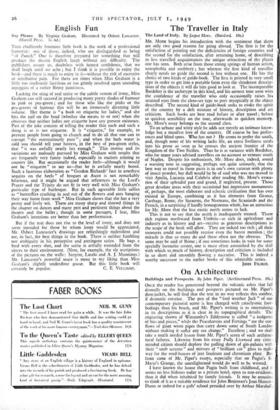The Traveller in Italy
The Land of Italy, By Jasper More. (Batsford. 18s.) MR. MORE begins his introduction with the sentiment that them are only two good reasons for going abroad. The first is for the satisfaction of pointing out the deficiencies of foreign countries and • the second for the satisfaction, after returning home, of describing to less travelled acquaintances the unique attractions of the places one has seen. Both arise from those strong springs of human action, xenophobia and snobbery ; but whereas the first kind of traveller clearly needs no guide the second is lost without one. He has the choice of two kinds of guide-book. The first is printed in very small type in order to get into a portable form even the slenderest descrip- tions of the objects it will do him good to look at. The incomparable Baedeker is the archetype in this kind, and his earnest tone soon wins the confidence of the traveller who only occasionally raises his strained eyes from the close-set type to peer myopically at the object described. The second kind of guide-book seeks to evoke the spirit of the country by a deft mixture of history, description and art criticism. Such books are best read before or after travel ; before to quicken sensibility on the tour, afterwards to quicken memory. Mr. More's essay belongs to the second class.
To an urbane and witty style he adds not merely an intimate know- ledge but a manifest love of the country. Of course he has prefer- ences and blind spots. Who has not ? He seems to prefer the south, and, though none of his writing lacks life, an extra liveliness steals into his prose as soon as he crosses the ancient frontier of the Kingdom of the Two Sicilies. Thus he is at variance with Baedeker, who for many years advised travellers on no account to venture south of Naples. Despite his enthusiasm, Mr.-More does, indeed, sound a warning note in suggesting, perhaps not quite seriously, that the best way to travel in those parts is in one's own caravan with plenty of insect powder, but dull would he be of soul who was not moved to visit Apulia, Lucania and Calabria after reading Mr. More's evoca- tion of their splendid past and grand, if neglected, present. Those great desolate areas with their occasional but impressive monuments of, perhaps, the most elaborate and eclectic civilisation that has ever existed in Europe, combining as it has elements from Greece, Carthage, Rome, the Saracens, the Normans, the Scaniards and the French, in a surprising if hardly homogeneous whole, has an attraction for Mr. More that the less exotic north seems to lack.
This is not to say that the north is inadequately treated. Those rich regions northward from Umbria—as rich in agriculture and industry as in history and art—receive as generous descriptions as the scope-of the book will allow. They are indeed too rich ; all their treasures could not possibly receive even the barest mention ; the miracle is that so many do and these often not the obvious. The same may be said of Rome ; if one sometimes looks in vain for some specially favourite corner, one is more often astonished by the skill with. which so much of history, description and criticism is included in so short and smoothly flowing a narrative. This is indeed a worthy successor to the earlier books of this admirable series.
Jour FILMER.






































 Previous page
Previous page